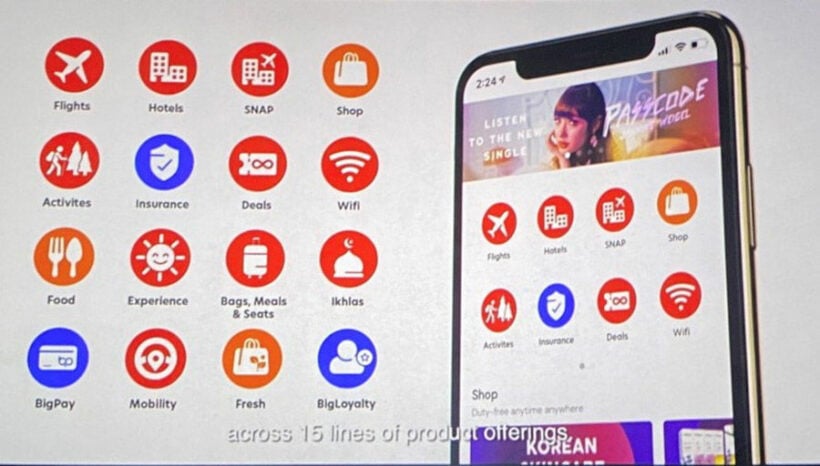Air Asia seeks to mitigate economic losses with launch of “super app”

Air Asia is introducing a super app, in an attempt to off-set – at least partially – the significant financial losses brought about by the Covid-19 pandemic. The mobile application shuffles Air Asia’s model as a flight and accommodation provider, to a broader platform of complimentary services. The app will offer users a variety of options, including digital payment services, delivery services, and an e-commerce platform. Air Asia Chief Executive and founder, Tony Fernandes, says the idea for the app was floated prior to the pandemic, but Covid-19 hastened its development.
Air Asia’s Thai subsidiary, the majority Thai-owned Thai Air Asia, has been back flying domestic routes around Thailand since the Civil Aviation Authority of Thailand lifted restrictions in June.
“This journey didn’t start during the pandemic, this journey started 2 years ago, but it was accelerated because of the outbreak. This is not a Plan B, this was always our Plan A, but we still think aviation will definitely come back.”
Air Asia was hit with losses of US$238 million in the second quarter of 2020 and says it desperately needs to seek new sources of revenue while the economic effects of Covid-19 continue to be felt around the globe. The Bangkok Post reports that from October 8, users in Thailand and the wider ASEAN region can access the new app through the company’s website or through its existing mobile app.
Fernandes says payment and logistics services will be provided by the airline’s subsidiary operation, Air Asia Digital. Users will be able to book flights (including those of other airlines) and hotels, as well as enroling in a rewards programme.
“Air Asia’s roots are from moving people from A to B and moving cargo from A to B, and that is the basis of Air Asia Digital and the basis for our platform AirAsia.com.”
The app is expected to face tough competition from super apps Grab and Gojek, currently understood to be in merger talks. Should a merger go ahead, the combined operation would create a monopoly on food delivery and car-hailing services in the ASEAN region. However, Fernandes remains optimistic, with the airline hoping to complement existing services.
“I don’t believe we are here to compete, but here to complement. Airlines always see us as competitors, but we complemented the full service and created a new market that was not there. Before, only a few people could fly, now everyone can fly, and in the same way we will complement the market.”
SOURCE: Bangkok Post
Catch up with the latest daily “Thailand News Today” here on The Thaiger.
Latest Thailand News
Follow The Thaiger on Google News:


























